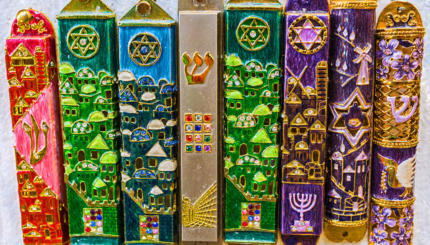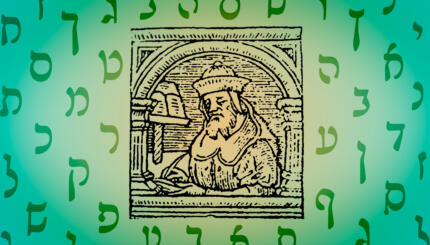Question: I’m about to put a mezuzah up on the doorframe of my new apartment, and all of the articles I’ve read say to put it at a slant, but none of them mention why. What’s the deal with slanting the mezuzah?
–Shira, Cleveland
Answer: A slanted mezuzah is a great example of a compromise in Jewish law, Shira. It might look screwy to you, but it’s actually a demonstration of two legal authorities literally meeting in the middle.
Way back in the 11th century, Rashi, a French rabbi and commentator, opined that when you put up your mezuzah, it should be hung vertically (Rashi and Tosafot on Menahot 33a). But then Rashi’s grandson came along. He’s known as Rabbenu Tam, and he wrote that a mezuzah should be affixed horizontally, because the Ten Commandments and the Torah scrolls were kept horizontally in the ark in the Temple.
A hundred and fifty years later Rabbi Jacob Ben Asher, also sometimes called the Tur, was writing his book of Jewish law, the Arbaah Turim. In it, Ben Asher suggests that the way to hold by the precedents of both Rashi and Rabbenu Tam was to split the difference, and affix your mezuzah at a slant (pointing into the room). (Yoreh Deah 289)
Three hundred years later this view was codified again by the Rema, an Ashkenazi commentator, who noted that slanting a mezuzah had become the common custom among Ashkenazi Jews. (Sephardi and Mizrahi Jews today still hang their mezuzot vertically.)
It’s rare to find a Jewish custom that was so clearly developed as a compromise between two different interpretations of one commandment. When you put up your mezuzah on a slant, think of how you’re acknowledging the ways multiple voices and perspectives are welcome and encouraged in Jewish life.
ark
Pronounced: ark, Origin: English, the place in the synagogue where the Torah scrolls are stored, also known as the aron kodesh, or holy cabinet.
Ashkenazi
Pronounced: AHSH-ken-AH-zee, Origin: Hebrew, Jews of Central and Eastern European origin.
mezuzah
Pronounced: muh-ZOO-zuh (oo as in book), Origin: Hebrew, a small box placed on the right doorpost of Jewish homes. It contains a parchment scroll with verses from the Torah inscribed on it, including the Shema prayer (Deuteronomy 6:4-9, 11:13-21).
Torah
Pronunced: TORE-uh, Origin: Hebrew, the Five Books of Moses.



